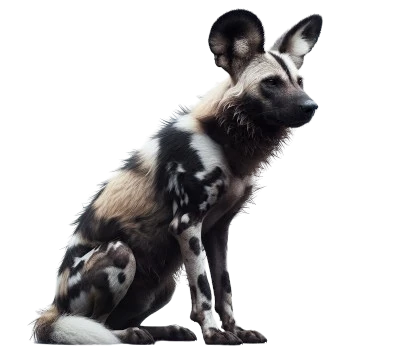
The Lycaon (Lycaon pictus), also known as the African wild dog, is a social predator endemic to Africa. Known for their pack hunting abilities and sophisticated social behaviors, these canids play an essential role in balancing African savanna ecosystems.
The Lycaon is a medium-sized canid, measuring between 60 and 75 cm at the shoulder and weighing between 18 and 36 kg. Its coat is patchy, typically consisting of yellow, black, and white colors, which helps it blend into its natural environment. It has large, rounded ears and sharp eyes, which are distinctive features of the species.
The Lycaon (Lycaon pictus) belongs to the Canidae family.
The Lycaon is one of the most endangered canid species in Africa, with its population declining due to habitat loss and human-wildlife conflict.
The Lycaon primarily inhabits savannas, grasslands, and woodlands in sub-Saharan Africa. It avoids dense forests and prefers open areas where it can hunt in groups. Their territory size varies depending on prey availability and environmental conditions.
Lycaons are highly social animals and live in packs, often led by a dominant pair. A Lycaon pack can consist of 2 to 27 members, and they work closely together during hunts. Pack members share strong bonds and often engage in mutual grooming behaviors. They use vocalizations, postures, and gestures to communicate with each other.
Obligate carnivores, Lycaons primarily prey on large herbivores like gazelles, impalas, and antelopes. Their hunting technique is highly cooperative: they use group strategies to encircle and bring down their prey. They are also capable of covering large distances during hunts.
The Lycaon is classified as endangered by the International Union for Conservation of Nature (IUCN). Habitat loss, fragmentation of territories, and diseases transmitted by domestic dogs are the main threats to their survival. Conservation efforts are underway to protect their habitats and reduce conflicts with humans.
The African Wild Dog belongs to the genus Lycaon, which also includes the Ethiopian Wolf (Canis simensis). These two species share unique characteristics within the Canidae family, notably their highly developed social behavior and their ability to hunt in packs.
Observing a Lycaon in the wild can be an exciting experience, but it is important to respect the animal and its environment. Here are some tips for observers:
By following these tips, you will help preserve this fascinating species while enjoying a respectful wildlife observation experience.